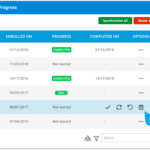Physical fitness is an effective way to reduce anxiety and improve overall mental health. Studies have consistently shown that regular exercise can reduce the symptoms of anxiety and help people to better cope with stress. From calming yoga to heart-pumping cardio, there are plenty of ways to use physical activity to manage anxiety. Whether you’re an experienced athlete or simply looking for a way to calm down, there’s a fitness routine that can help you become more relaxed and better manage your mental health. In this article, we’ll look at how fitness can help manage anxiety and provide tips on how to find the right workout for you.
Advantages of Fitness for Mental Health

Exercising can be one of the most helpful things you can do for your mental health. It has a plethora of benefits that can help you deal with anxiety and other mental health issues. The advantages of fitness for mental health include improved mood, better sleep, reduced stress, enhanced self-esteem, and increased resilience. Not to mention the physical health benefits such as improved cardiovascular health, weight loss, and an overall healthier lifestyle. Exercising doesn’t have to be going to the gym and lifting weights. It can be as simple as taking a walk to your local park or riding your bike around your neighborhood. It’s important to find an activity that you enjoy and will want to continue doing, as consistency is key. When you make fitness a part of your lifestyle, you can start to experience the positive effects it has on your mental health. So grab your sneakers and get moving!
Exercises that Help Reduce Anxiety

Exercising to reduce anxiety is one of the best things you can do for yourself. Not only does it help to keep your body healthy, but it can also help to reduce stress and anxiety. Running and jogging are great aerobic exercises to reduce anxiety. It’s a great way to get in some cardio and get those endorphins flowing. Plus, the repetitive motion of running can help to put your mind at ease. Yoga is another excellent form of exercise for reducing anxiety. The focus on breathing and stretching can be really calming and you can practice mindfulness in the process. If you’re looking for something a bit more intense, strength training and HIIT workouts are great options. They can help to release stress and give you a mental and physical challenge. No matter what type of exercise you choose, make sure you are doing something that you enjoy and that makes you happy. This will help to keep your anxiety levels down and let you live your life to the fullest.
The Benefits of Regular Exercise

Exercising regularly has a ton of benefits for your mental and physical health, one of which is reducing anxiety. Not only does regular exercise help improve your overall physical health, but it also boosts your mood and helps you manage stress. In addition, it can help you stay mindful and increase your self-esteem. Exercise releases endorphins which are the natural hormones that make you feel good. When you exercise, you’re able to get your mind off of whatever is stressing you out, and you gain a sense of accomplishment from meeting your fitness goals. If you’re looking for an effective way to manage your anxiety, regular exercise is a great option. Not only can it help you reduce anxiety in the moment, but also it can help you become more resilient and better equipped to handle stress in the future.
Understanding the Stress-Anxiety Relationship

Understand the Stress-Anxiety RelationshipIt’s important to understand the relationship between stress and anxiety. Stress can help to trigger anxiety. When you’re feeling stressed, it’s normal to feel anxious. This is because the body’s natural response to stress is to prepare for danger. This can cause physical symptoms such as increased heart rate, sweating, and muscle tension. In some cases, stress can even lead to panic attacks. For this reason, it’s important to learn how to manage stress so that it doesn’t lead to anxiety. One way to do this is through exercise. Physical activity can help reduce stress hormones, which can help reduce anxiety symptoms. Exercise can also help to lower blood pressure and reduce muscle tension, both of which can help to alleviate anxiety. So if you’re feeling stressed and anxious, try taking a walk or going for a run to help reduce your symptoms.
How to Incorporate Exercise into Your Routine to Help Manage Anxiety

If you’re looking to incorporate exercise into your routine to help manage anxiety, the key is to start small and gradually increase the intensity and frequency of your workouts. Start by going for short walks around the neighborhood or doing some light stretching at home. As you get more comfortable with your routine, consider joining a gym or fitness class and try out some more intense workouts that get your heart rate up and work up a sweat. Remember to listen to your body and take breaks when needed. Exercise can help reduce anxiety, but it’s important to take it slow and not push yourself too hard. Doing this will help you stay motivated and stick to your routine, allowing you to reap all the benefits of exercise and improved mental health.




